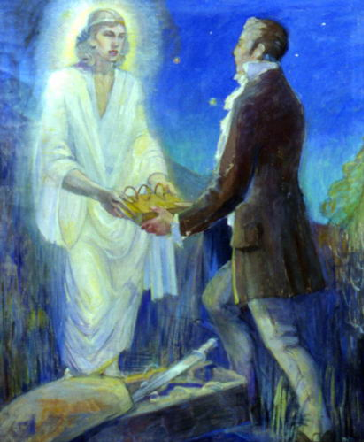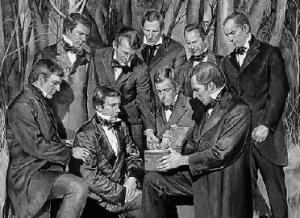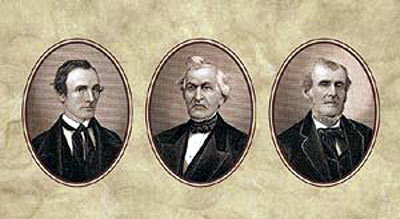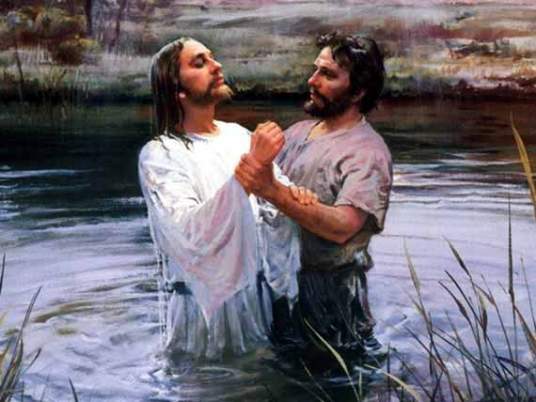If you take a close look at the Book of Mormon (and I hope you will), you will inevitably uncover a controversy: its origin.
 It was published in 1829 by Joseph Smith, but he did not claim authorship; his claims were a bit more extraordinary. He said an angel led him to the buried book, written on metal sheets the color of gold. The text was a form of hieroglyphics, and he was able to translate it into English over the course of a few months using “the gift and power of God” residing in a pair of special interpretive stones, the Urim and Thummim. When the translation was finished, the angel came and collected the gold plates and then the manuscript was taken to the printer.
It was published in 1829 by Joseph Smith, but he did not claim authorship; his claims were a bit more extraordinary. He said an angel led him to the buried book, written on metal sheets the color of gold. The text was a form of hieroglyphics, and he was able to translate it into English over the course of a few months using “the gift and power of God” residing in a pair of special interpretive stones, the Urim and Thummim. When the translation was finished, the angel came and collected the gold plates and then the manuscript was taken to the printer.
Joseph kept the gold plates hidden from the public at the Lord’s command; many find the story that the angel Moroni took them back to be suspiciously convenient. Since the plates are not available today for examination, skeptics have contended that there were no plates to begin with.
Does his story hold water?
Some dismiss the question too easily before examining any evidence. The story’s supernatural elements (an angel and a pair of interpreting stones) provide convenient rationale to attribute it to fiction. Even those who believe in the power of God may feel more comfortable disregarding the story because it doesn’t jive with their current conception of God or simply because it is something of which they’ve never heard. In essence they say, “Surely something so powerful and interesting, if true, would have been brought to my attention already.”
Joseph’s story is, admittedly, somewhat fantastical. It stretches one’s worldview. Fortunately, the Lord provided aid to the incredulous: eyewitnesses.
Were there actual gold plates?
 In the summer of 1829 in Manchester, New York, just after completing the translation, Joseph met with eight close associates and (with the Lord’s permission) showed them the gold plates. They were permitted to see, feel, and hold the record and examine closely the inscriptions on each leaf. They each signed the following testimonial, published with the Book of Mormon ever since (my emphasis):
In the summer of 1829 in Manchester, New York, just after completing the translation, Joseph met with eight close associates and (with the Lord’s permission) showed them the gold plates. They were permitted to see, feel, and hold the record and examine closely the inscriptions on each leaf. They each signed the following testimonial, published with the Book of Mormon ever since (my emphasis):
Be it known unto all nations, kindreds, tongues, and people, unto whom this work shall come: That Joseph Smith, Jun., the translator of this work, has shown unto us the plates of which hath been spoken, which have the appearance of gold; and as many of the leaves as the said Smith has translated we did handle with our hands; and we also saw the engravings thereon, all of which has the appearance of ancient work, and of curious workmanship. And this we bear record with words of soberness, that the said Smith has shown unto us, for we have seen and hefted, and know of a surety that the said Smith has got the plates of which we have spoken. And we give our names unto the world, to witness unto the world that which we have seen. And we lie not, God bearing witness of it.
Christian Whitmer
Jacob Whitmer
Peter Whitmer, Jun
John Whitmer
Hiram Page
Joseph Smith, Sen
Hyrum Smith
Samuel H. Smith
This was not some idle piece of writing for them. It implicated them. They were interviewed, accused, and mocked. From that day on, they each stood firm in their eyewitness testimony of these plates. Five of the eight remained in good standing with the Church, enduring mobs, extermination orders, and repeated forced expulsion from their homes. Jacob Whitmer and Hiram Page stopped practicing, but still believed; and John Whitmer was excommunicated in a later Church incident, but not one of them (not even John who had ample reason and opportunity to expose the prophet) rescinded his testimony. If there were no plates, the reason for their steadfastness becomes a mystery.
Others had experiences that confirm the existence of the plates. For instance, Joseph’s wife Emma described the following concerning the period of translation:
The plates often lay on the table without any attempt at concealment, wrapped in a small linen tablecloth, which I had given him to fold them in. I once felt of the plates, as they thus lay on the table, tracing their outline and shape. They seemed to be pliable like thick paper, and would rustle with a metallic sound when the edges were moved by the thumb, as one does sometimes thumb the edges of a book.
These testimonies, among others, corroborate the young prophet’s story of the gold plates. It is strong evidence that they existed.
Was there an actual angel?
A few days prior to the eight witnesses’ encounter with the plates, three of Joseph’s closest friends were given a more miraculous manifestation. The gold plates were revealed at the hands of the angel Moroni and the voice of the Lord declared the record to be true. Their testimony accompanies each copy of the Book of Mormon as well:
Be it known unto all nations, kindreds, tongues, and people, unto whom this work shall come: That we, through the grace of God the Father, and our Lord Jesus Christ, have seen the plates which contain this record, which is a record of the people of Nephi, and also of the Lamanites, their brethren, and also of the people of Jared, who came from the tower of which hath been spoken. And we also know that they have been translated by the gift and power of God, for his voice hath declared it unto us; wherefore we know of a surety that the work is true. And we also testify that we have seen the engravings which are upon the plates; and they have been shown unto us by the power of God, and not of man. And we declare with words of soberness, that an angel of God came down from heaven, and he brought and laid before our eyes, that we beheld and saw the plates, and the engravings thereon; and we know that it is by the grace of God the Father, and our Lord Jesus Christ, that we beheld and bear record that these things are true. And it is marvelous in our eyes. Nevertheless, the voice of the Lord commanded us that we should bear record of it; wherefore, to be obedient unto the commandments of God, we bear testimony of these things. And we know that if we are faithful in Christ, we shall rid our garments of the blood of all men, and be found spotless before the judgment-seat of Christ, and shall dwell with him eternally in the heavens. And the honor be to the Father, and to the Son, and to the Holy Ghost, which is one God. Amen.
Oliver Cowdery
David Whitmer
Martin Harris

As you can see, these witnesses had a different type of encounter with the gold plates. They saw an angel and heard the voice of God. They were commanded to “bear record of it,” or tell people about it.
Now, just the testimony of these three alone would be solid ground for a case in a court of law, but there is another even juicier part of this tale. Several years later, all three of these men struggled with Joseph Smith’s leadership and were excommunicated from the Church. For some time they were among Joseph’s strongest critics, yet every time they were interviewed (and there were hundreds of interviews, usually with very skeptical interrogators), they would each enthusiastically stand by their commitment to bear record of the plates and the angel who revealed them.
Oliver Cowdery and Martin Harris eventually made amends with the Church leadership and returned to full fellowship. David Whitmer remained separate from the Church, but committed to believing in the Book of Mormon and the angel Moroni. Every one of them testified of the plates on their death beds.
Is Joseph’s story true?
That is a question you must decide for yourself. Eight eyewitnesses claimed to have seen and hefted the plates and committed their testimony to writing. Emma felt them through a cloth on the table. Three eyewitnesses had them presented by an angel and lived up to the command to testify. Even when they most wanted to see the prophet fail and could have recanted and exposed him, they didn’t. Even at death’s door, with nothing left to gain, they stood by their words. And these are just a few examples among many more.
These things may be enough to convince you or not; I don’t know. I only hope to illustrate that there are good, rational reasons to believe Joseph Smith’s story.
The witnesses weren’t what made me believe it, but learning about them helped solidify my belief. Really what convinced me was reading the book that came from these gold plates. Near the end of the book, Moroni (the angel) writes, “by the power of the Holy Ghost ye may know the truth of all things.” Read it yourself and take the chance to ask God in prayer if it is true.
The power of God is not a fairy tale. When He brings forth scripture, He provides witnesses; when He calls a prophet, He gives reason to believe. His actions make tangible marks on the world. When you pray to Him, He will give distinct answers to your heart and mind.




